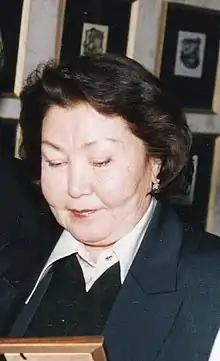Sara Nazarbayeva
Sara Alpysovna Nazarbayeva (Kazakh: Сара Алпысқызы Назарбаева, Sara Аlpysqyzy Nazarbaeva, [ˈsɑɾɑ ɑlpəsqəˈzə nɑzɑɾˈbɑjɪvɑ]), Russian: Сара Алпысовна Назарбаева, né Konakayeva (Qonaqaeva, Конакаева), born 12 February 1941, in Kzyl-Zhar, present-day Kazakhstan) served as the First Lady of Kazakhstan and is the wife of President Nursultan Nazarbayev. She married Nursultan in 1962 after her graduation. They have three daughters — Dariga, Dinara and Aliya — and as well as six grandchildren and a great granddaughter.[1][2]
Sara Nazarbayeva Сара Назарбаева | |
|---|---|
 Nazarbayeva in 2000 | |
| First Lady of Kazakhstan | |
| In role 16 December 1991 – 20 March 2019 | |
| President | Nursultan Nazarbayev |
| Preceded by | Position created |
| Succeeded by | Nadezhda Tokayeva |
| Personal details | |
| Born | Sara Alpysovna Konakaeva 12 February 1941 Kzyl-Zhar, Kazakh SSR, Soviet Union (now Kazakhstan) |
| Spouse(s) | Nursultan Nazarbayev (m. 1962–present) |
| Children | Dariga Dinara Aliya |
A trained economics engineer, Nazarbayeva is the Founder and Chair of Bobek an International Children's Charity Fund. For her work with children she is a winner of the Ihsan Dogramaci Family Health Foundation Prize from the World Health Organization in 1997[3] and The International Unity Prize.[4]
Work with children
Nazarbayeva is the President of Bobek, an International Children's Foundation, which she founded in 1992 soon after Kazakhstan became an independent republic. She created Bobek to help mother and child care, provide supervision of foundling homes and orphanages, provide equipment and supplies to schools, aid gifted children from low-income families, and to assist the child health care system.
In 1997 she launched the first National Children's Rehabilitation Center and the "S.O.S. Children's Villages of Kazakhstan" which are family villages for orphans. These consist of several houses built together in a group where many children live in one house with several caretakers. Nazarbaeva's plans for the children's villages enable the orphaned children to grow up in a family atmosphere.
References